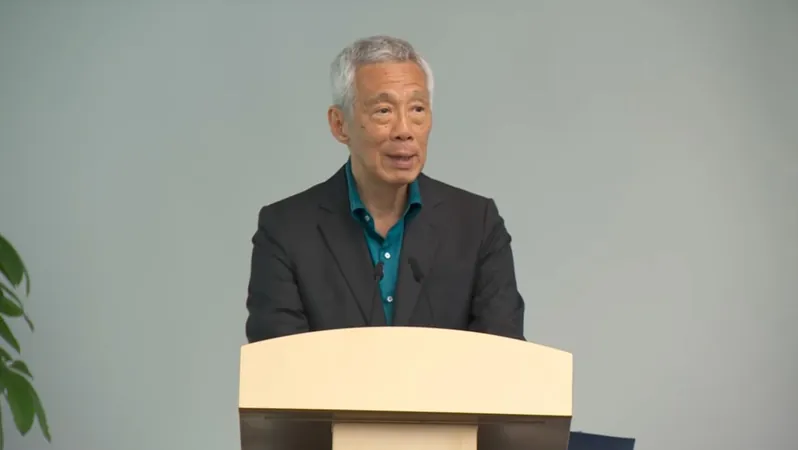
Japan Emerges as a Stabilizing Force in Southeast Asia and Asia-Pacific, Says Senior Minister Lee Hsien Loong
2025-04-02
Author: Rajesh
SINGAPORE: In a world navigating through unprecedented challenges, Senior Minister Lee Hsien Loong emphasized that Japan could assume a crucial "stabilizing role" in Southeast Asia and the broader Asia-Pacific region during a speech at the launch of the book "The Land of the Rising Sun and the Lion City: The Story of Japan and Singapore" at the National Library on April 2.
Mr. Lee expressed concerns that fundamental assumptions about defense alliances, nuclear deterrence, and non-proliferation are being questioned in today’s volatile environment. "In such an environment, I believe Japan can play a useful stabilizing role, and contribute to the well-being not just of Southeast Asia, but of the wider Asia-Pacific," he stated, reiterating his encouragement for Japan’s increased involvement in regional security matters first voiced in 2022 and reiterated at the 2023 ASEAN-Japan Commemorative Summit.
Highlighting Japan’s evolution in security cooperation over the past decade, Mr. Lee pointed out that Japan began engaging with the ASEAN Defence Ministers’ Meeting in 2014 and further enhanced ties in 2023, especially in areas like maritime security, cyber security, and arms control measures.
Singapore has welcomed Japan's growing role, recognizing its steadfast partnership that has flourished for over fifty years. Both nations share similar perspectives on significant global issues, notably the necessity of upholding a multilateral trading system and a rules-based international order. "Singapore is, and will always be, a trusted and reliable partner for Japan in this joint endeavor," Mr. Lee affirmed.
A Historical Context of Ties
In his address, Mr. Lee also explored the evolution of bilateral relations between Singapore and Japan since World War II, highlighting a transformation from a painful wartime history to a pragmatic post-war economic collaboration. Mr. Lee acknowledged that the topic of security cooperation has historically posed a challenge, given the shared scars of the past. "For the generation who lived through the war and occupation, this was a bridge too far," he remarked.
Reflecting on Japan's post-war stance, Mr. Lee cited the Fukuda doctrine of 1977, wherein Japan refrained from embracing a military power role despite possessing the capacity to rearm and develop nuclear weapons. Even in 1991, when Japan deployed minesweepers to aid coalition forces in the Gulf War, there were persistent unease and skepticism across many Asian nations.
However, he pointed out that as the present generation moves forward without the heavy emotional burden of the past, perceptions are beginning to change. The modern Japanese populace embodies different social and political values, which has been evident in the concerted efforts of successive Japanese prime ministers to foster trust with nations across Asia.
"These governments have undertaken deliberate measures to communicate Japan’s security posture while remaining sensitive to historical concerns," Mr. Lee noted.
Navigating Current Geopolitical Tensions
Addressing the current geopolitical landscape, Mr. Lee highlighted the existence of three nuclear powers in the Asia-Pacific, excluding North Korea, against the backdrop of growing rivalry between the United States and China. He mentioned escalating tensions in regions such as the Taiwan Strait, East China Sea, and South China Sea, prompting Southeast Asian countries to reassess their security strategies and collaborations with Japan.
As the dynamics of regional security continue to evolve, Mr. Lee expressed hope that Japan and its ASEAN partners will demonstrate the political wisdom and leadership needed to forge enduring friendships and jointly foster regional peace and prosperity. With an eye towards the future, Japan appears poised to play a vital role in shaping a stable and secure Asia-Pacific realm, a shift that could significantly impact the geopolitical landscape in the years to come.



 Brasil (PT)
Brasil (PT)
 Canada (EN)
Canada (EN)
 Chile (ES)
Chile (ES)
 Česko (CS)
Česko (CS)
 대한민국 (KO)
대한민국 (KO)
 España (ES)
España (ES)
 France (FR)
France (FR)
 Hong Kong (EN)
Hong Kong (EN)
 Italia (IT)
Italia (IT)
 日本 (JA)
日本 (JA)
 Magyarország (HU)
Magyarország (HU)
 Norge (NO)
Norge (NO)
 Polska (PL)
Polska (PL)
 Schweiz (DE)
Schweiz (DE)
 Singapore (EN)
Singapore (EN)
 Sverige (SV)
Sverige (SV)
 Suomi (FI)
Suomi (FI)
 Türkiye (TR)
Türkiye (TR)
 الإمارات العربية المتحدة (AR)
الإمارات العربية المتحدة (AR)